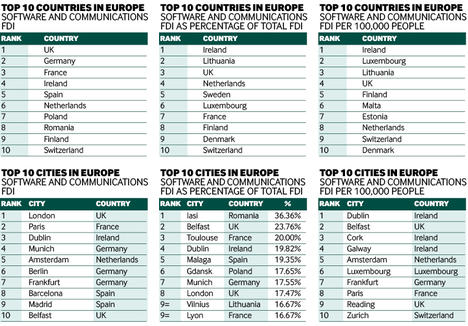ICT FDI into Europe has remained relatively steady since 2011, reaching a peak in 2013, with 1265 investments and a capital expenditure of $25.85bn. But although 2013 logged the highest number of inward investments, there were more investing companies and greater job creation in 2015.
London has attracted the lion’s share of European ICT investments since fDi Markets began recording data in 2003. Between November 2011 and October 2016, the city attracted 320 inward investment projects, worth an estimated $2.9bn, creating almost 7000 new jobs. Almost half of investors cited proximity to markets or customers as their primary reason for choosing the UK capital, followed by the domestic market growth potential.
Advertisement
Paris ranked second with 104 investments, more than 15% of which were expansions to existing facilities. Dublin, which ranked in third place, welcomed 89 projects with more than two-thirds coming from the US. Californian companies, in particular, accounted for almost 30% of all ICT FDI into Dublin.
The big sell
Overall, throughout Europe, nearly 60% of ICT investments were in sales office operations, while R&D accounted for more than 13% and headquarters operations for 10%.
More than one-third of total FDI in Iasi, the largest city in eastern Romania, came from ICT companies. This was the highest sector concentration of any European city. Belfast ranked second with 23.76% of its total FDI in ICT, followed by Toulouse with 20%.
Cities from the UK and Ireland featured heavily in the rankings on a per capita basis, claiming the top three positions and placing in five out of the total 10 positions. Dublin ranked first, Belfast second and Cork in third, with Galway and Reading placing fourth and ninth, respectively.
The effect on investment of the UK's decision to leave the EU remains to be seen. The Centre of European Performance, an interdisciplinary research centre at the London School of Economics, expects FDI in the UK to decline by about one-fifth. Several companies have already expressed an interest in relocating their headquarters in the wake of the decision, such as London-based online and mobile payment provider Azimo, while others have cancelled plans to invest in the country.
Advertisement
Cornelia Yzer, Berlin’s economic minister, is keen to turn the situation to Germany’s advantage. “Berlin will exploit the opportunity provided by Brexit,” she says. “These companies need to be at the heart of Europe, and where is better than the capital of Europe’s strongest economy?”
Whether or not Germany will be able to topple the current ICT hubs in Europe remains to be seen.

Methodology
To compile the list of locations for this study, fDi Intelligence, a data division of the Financial Times, looked at the FDI data between January 2011 and October 2016 in the software and communications sectors. Locations were ranked on their record of investment in these sectors considering project numbers, software and communications as a share of total FDI and on a per capita basis. Locations were ranked at both country and city level.